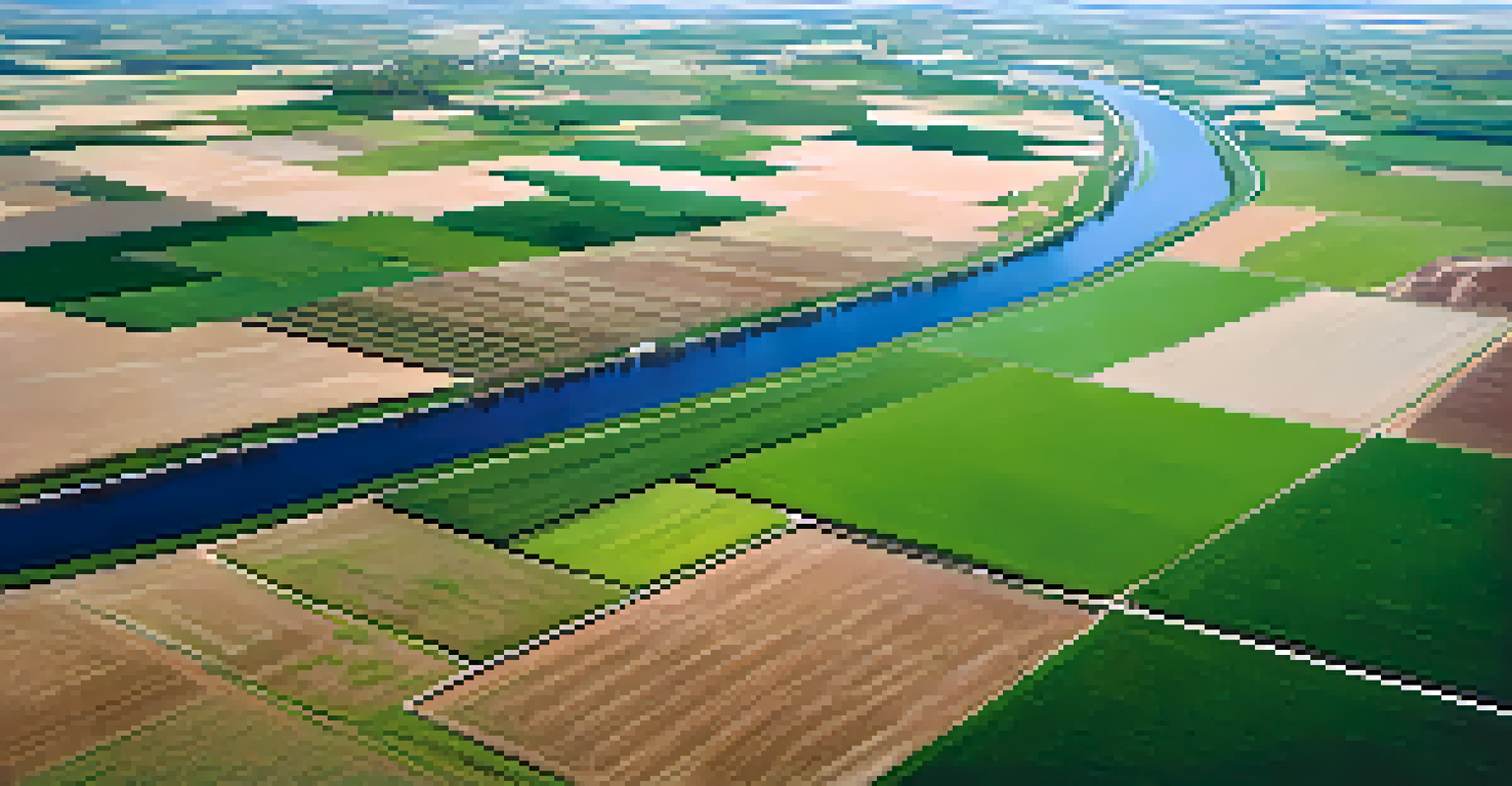Impact of Climate Change on Illinois Water Resources Management

Overview of Illinois Water Resources and Climate Change
Illinois is rich in water resources, with numerous rivers, lakes, and aquifers that support agriculture, industry, and recreation. However, climate change poses significant challenges to these vital resources. Rising temperatures and shifting precipitation patterns are altering the availability and quality of water across the state.
Water is the driving force of all nature.
As we delve deeper into this issue, it’s crucial to understand how climate change impacts various water sources. For instance, increased rainfall intensity can lead to flooding, while prolonged droughts can strain water supplies. Both extremes create a balancing act for resource management.
Ultimately, recognizing the connection between climate change and water resources is the first step toward effective management strategies. By being aware of these impacts, stakeholders can work together to mitigate risks and adapt to the changes that lie ahead.
Effects of Temperature Changes on Water Supply
Rising temperatures in Illinois are leading to increased evaporation rates, which can diminish water supply in lakes and reservoirs. This is particularly concerning during summer months when water demand peaks for irrigation and household use. A warmer climate can thus strain our existing water systems.

Moreover, the increase in temperature can exacerbate the growth of harmful algal blooms in lakes and rivers. These blooms not only affect water quality but can also harm aquatic life and pose health risks to humans. Therefore, maintaining water quality becomes an additional challenge in the face of warming temperatures.
Climate Change Affects Water Supply
Rising temperatures and altered precipitation patterns in Illinois are leading to increased evaporation and inconsistent water availability.
Addressing these temperature-related issues requires innovative management practices. By implementing strategies like water conservation and improved irrigation techniques, Illinois can better adapt to the realities of a changing climate.
Precipitation Patterns and Their Impacts
Climate change is altering precipitation patterns across Illinois, leading to unpredictable weather events. While some areas may experience heavier rainfall, others face prolonged dry spells. These changes can significantly impact local water resources, as inconsistent rainfall affects groundwater recharge and surface water levels.
We never know the worth of water till the well is dry.
For example, heavy rainfall can lead to flash flooding, which not only damages infrastructure but also washes away valuable topsoil, affecting agricultural productivity. Conversely, drought conditions can lead to water shortages, making it difficult for farmers to maintain their crops.
To combat these challenges, Illinois must adopt adaptive water management strategies that account for these changing precipitation patterns. This includes improving stormwater management systems and enhancing groundwater recharge efforts to ensure a more resilient water supply.
Impact on Groundwater Resources
Groundwater is a crucial resource for Illinois, particularly for agricultural irrigation and drinking water supply. However, climate change can lead to reduced groundwater recharge during dry periods, creating a potential crisis for communities that rely on this resource. As precipitation becomes more erratic, the sustainability of groundwater resources is increasingly at risk.
Additionally, over-extraction of groundwater to compensate for surface water shortages can lead to long-term depletion. This not only threatens current water supplies but can also cause land subsidence, which negatively impacts infrastructure and ecosystems.
Groundwater Resources at Risk
Erratic rainfall and over-extraction threaten the sustainability of groundwater, crucial for both agriculture and drinking water.
To protect groundwater resources, Illinois needs a comprehensive approach that includes sustainable extraction practices and investment in recharge projects. This will help ensure that groundwater remains a reliable resource for future generations.
Water Quality Challenges in a Changing Climate
Climate change also brings significant challenges to water quality in Illinois. Changes in temperature and precipitation can affect the concentrations of pollutants in water bodies, leading to degraded water quality. For instance, increased runoff during heavy rains can wash more contaminants into rivers and lakes, impacting both human health and aquatic ecosystems.
Moreover, climate-driven events like flooding can overwhelm wastewater treatment facilities, leading to untreated sewage being released into waterways. This not only poses immediate health risks but can also have long-term effects on local ecosystems.
To address these water quality issues, it’s essential for Illinois to enhance monitoring and treatment capabilities. Implementing green infrastructure solutions, such as rain gardens and permeable pavements, can help mitigate runoff and improve water quality.
The Role of Policy in Water Management
Effective policy is vital for managing water resources in the face of climate change. Illinois must develop policies that promote sustainable water use and encourage collaboration among stakeholders, including farmers, municipalities, and conservation groups. By creating a unified approach, the state can better address the complex challenges posed by climate change.
Additionally, policies should focus on integrating climate adaptation strategies into existing water management frameworks. This can involve updating regulations to reflect current conditions and encouraging investment in infrastructure that can withstand extreme weather events.
Need for Effective Water Policies
Strong policies promoting sustainable water use and community engagement are essential for managing Illinois' water resources amid climate change.
Ultimately, strong policy can pave the way for a more resilient water management system in Illinois. By prioritizing sustainability and adaptability, the state can safeguard its water resources for future generations.
Community Engagement and Public Awareness
Community engagement is crucial for effective water resource management in Illinois. When residents understand the impacts of climate change on their local water systems, they are more likely to participate in conservation efforts and support sustainable practices. Educational programs can help raise awareness about the importance of water conservation and the role individuals play in protecting this vital resource.
Furthermore, involving local communities in decision-making processes can lead to more effective and culturally relevant solutions. By tapping into local knowledge and values, policymakers can create programs that resonate with residents and encourage active participation.

Overall, fostering a culture of awareness and engagement can enhance Illinois' resilience to climate change. When communities are informed and involved, they can contribute to more sustainable water management practices.
Conclusion: Preparing for the Future of Water Management
In conclusion, the impact of climate change on Illinois water resources management is profound and multifaceted. From changes in temperature and precipitation to challenges in water quality, the state faces numerous obstacles that require immediate attention. By understanding these implications and adopting proactive management strategies, Illinois can navigate the complexities of climate change.
Collaboration among government agencies, local communities, and stakeholders will be essential in developing adaptive solutions. By prioritizing sustainability, policy innovation, and public awareness, Illinois can create a water management system that is resilient to future climate challenges.
Ultimately, preparing for the future of water management means embracing change and fostering a collective commitment to protect our precious water resources. With concerted efforts, Illinois can secure a sustainable water future for all its residents.